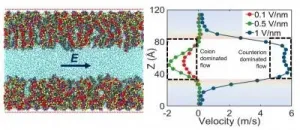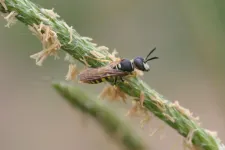(Press-News.org) Taking multivitamins, omega-3, probiotics or vitamin D supplements may lessen the risk of testing positive for SARS-CoV-2, the virus responsible for COVID-19 infection--at least among women--indicates a large population study, published online in the journal BMJ Nutrition Prevention & Health.
But taking any of vitamin C, zinc, or garlic supplements wasn't associated with a lower risk of testing positive for the virus, the findings show.
There has been plenty of celebrity endorsement of the use of dietary supplements to both ward off and treat COVID-19 infection since the start of the pandemic, note the researchers.
In the UK alone, market share rose by 19.5% in the period leading up to the first national 'lockdown' on March 23 last year, with sales of vitamin C rising by 110% and those of multivits by 93%.
Similarly, zinc supplement sales rose by 415% in the first week of March, at the height of COVID-19 fears in the USA.
Dietary supplements can help to support a healthy immune system, but whether specific supplements might be associated with a lower risk of catching SARS-CoV-2 isn't known.
In a bid to plug this knowledge gap, the researchers drew on adult users of the COVID-19 Symptom Study app to see if regular supplement users were less likely to test positive for SARS-CoV-2.
The app was launched in the UK, the US, and Sweden in March 2020 to capture self-reported information on the evolution of the pandemic.
Initially, it recorded the location, age and core health risk factors of its users. But as time went on, subscribers were asked to provide daily updates on a range of issues, including symptoms, coronavirus test results, and healthcare. People without obvious symptoms were also encouraged to use it.
For the purposes of this study, the researchers analysed information supplied by 372,720 UK subscribers to the app about their regular use of dietary supplements throughout May, June, and July 2020 during the first wave of the pandemic as well as any coronavirus swab test results.
Between May and July,175,652 UK subscribers regularly took dietary supplements;197,068 didn't. Around two thirds (67%) were women and over half were overweight (BMI of 27).
In all, 23,521 people tested positive for SARS-CoV-2 and 349,199 tested negative between May and July.
Taking probiotics, omega-3 fatty acids, multivits or vitamin D was associated with a lower risk of SARS-CoV-2 infection: by 14%, 12%, 13% and 9%, respectively, after accounting for potentially influential factors, including underlying conditions and usual diet.
No such effects were observed among those taking vitamin C, zinc, or garlic supplements.
And when the researchers looked specifically at sex, age and weight (BMI), the protective associations for probiotics, omega-3 fatty acids, multivits and vitamin D were observed only in women of all ages and weights. No such clear associations were seen in men.
Despite some differences, the same overall patterns were mirrored in both the US (45,757) and Swedish (27,373) subscribers.
The equivalent figures for the US and Sweden were a reduced risk of:18% and 37%, respectively for probiotics; 21% and 16%, respectively, for omega-3 fatty acids; 12% and 22%, respectively for multivits; and 24% and 19%, respectively, for vitamin D supplements.
This is an observational study, and as such, can't establish cause. The researchers also acknowledge several limitations, including that the study relied on self reported data and a self selected group. No information was collected on supplement doses or ingredients either.
But although the observed effects were modest, they were significant, note the researchers, who call for large clinical trials to inform evidence-based therapeutic recommendations.
"We know that a range of micronutrients, including vitamin D, are essential for a healthy functioning immune system. This, in turn, is key to prevention of, and recovery from, infections.
"But to date, there is little convincing evidence that taking nutritional supplements has any therapeutic value beyond maintaining the body's normal immune response," comments Professor Sumantra Ray, Executive Director, NNEdPro Global Centre for Nutrition and Health, which co-owns the journal.
"What's more, this study wasn't primarily designed to answer questions about the role of nutritional supplements in COVID-19. This is still an emerging area of research that warrants further rigorous study before firm conclusions can be drawn about whether specific nutritional supplements might lessen the risk of COVID-19 infection," he cautions.
INFORMATION:
Externally peer reviewed? Yes
Evidence type: Observational
Subjects: People
Nanochannels have important applications in biomedicine, sensing, and many other fields. Though engineers working in the field of nanotechnology have been fabricating these tiny, tube-like structures for years, much remains unknown about their properties and behavior.
Now, University of Maryland mechanical engineering associate professor Siddhartha Das and a group of his Ph.D. students have published surprising new findings in the journal ACS Nano. Using atomic-level simulations, Das and his team were able to demonstrate that charge properties as well as charge-induced fluid flow within a functionalized nanochannel does not always behave as expected.
"We've discovered a new context for nanochannels functionalized by grafting ...
One of the marks of a successful idea in science is how quickly it can develop and evolve. In the case of the Anthropocene, the conceptual evolution has taken place with extraordinary speed. The strikingly influential hypothesis launched by the late Nobel laureate Paul Crutzen (Obituary, 24th Feb 2021) in 2000, was that the actions of an industrialised humanity has impacted the Earth so greatly as to trigger a new geological epoch. Originally developed within the Earth System science community in charting global environmental change, the Anthropocene then began ...
April 19, 2021 -- Ensuring COVID-19 vaccine access for refugee and displaced populations, and addressing health inequities, is vital for an effective pandemic response. Yet, vaccine allocation and distribution has been neither equitable nor inclusive, despite that global leaders have stressed this as a critical aspect to globally overcoming the pandemic, according to a paper published by Columbia University Mailman School of Public Health. Read "Leave No-one Behind: Ensuring Access to COVID-19 vaccines for Refugee and Displaced Populations" in the journal Nature Medicine.
As of April 1st, high and upper-middle-income countries received 86 percent of the vaccine doses delivered worldwide, while ...
Tools that allow neuroscientists to record and quantify functional activity within the living brain are in great demand. Traditionally, researchers have used techniques such as functional magnetic resonance imaging, but this method cannot record neural activity with high spatial resolution or in moving subjects. In recent years, a technology called optogenetics has shown considerable success in recording neural activity from animals in real time with single neuron resolution. Optogenetic tools use light to control neurons and record signals in tissues that are genetically modified ...
A group of scientists have just made a key discovery that could prevent and eradicate immune responses that lead to treatment failure in about one-third of people with severe hemophilia A.
Hemophilia is the most common severe inherited bleeding disorder in men. The disease affects 1 in 10,000 males worldwide and results from deficiency of blood clotting factor VIII (FVIII). Both children and adults with hemophilia A (80 percent of all hemophilia) receive treatment that involves infusing FVIII protein into the bloodstream. However, about 30 percent ...
Our planet's worst mass extinction event happened 252 million years ago when massive volcanic eruptions caused catastrophic climate change. The vast majority of animal species went extinct, and when the dust settled, the planet entered the early days of the Age of Dinosaurs. Scientists are still learning about the patterns of which animals went extinct and which ones survived, and why. In a new study in PNAS, researchers found that while extinctions happened rapidly in the oceans, life on land underwent a longer, more drawn-out period of extinctions.
"People assumed that because the marine extinction happened over a short period of time, life on land should have followed the same pattern, but we found that the marine extinction ...
Professor Nicole Boivin, Director of the Department of Archaeology at the Max Planck Institute for the Science of Human History in Jena, Germany, is part of an international initiative to examine the implications of past land use for contemporary conservation efforts.
The multi-disciplinary team, which includes archaeologists, ecologists, anthropologists and conservation managers, has reconstructed ancient population and land use to show that already by 12,000 years ago, humans had re-shaped much of the terrestrial biosphere.
Their data challenge the idea that conservation ...
New research published today in the Proceedings of the National Academy of Sciences (PNAS) shows that land use by human societies has reshaped ecology across most of Earth's land for at least 12,000 years. The research team, from over ten institutions around the world, revealed that the main cause of the current biodiversity crisis is not human destruction of uninhabited wildlands, but rather the appropriation, colonization, and intensified use of lands previously managed sustainably.
The new data overturn earlier reconstructions of global land use history, some of which indicated that most of Earth's land was uninhabited even as recently as 1500 CE. Further, ...
Diversity in diet plays a role in the complexity of venom in pit vipers such as rattlesnakes, copperheads and cottonmouths.
But new collaborative research by Clemson University scientists found the number of prey species a snake ate did not drive venom complexity. Rather, it was how far apart the prey species were from each other evolutionarily.
"It's not just diet that drives the variation in venom across snakes. It's the breadth of diet," said Christopher Parkinson, a professor in the College of Science's Department of Biological Sciences. "If a snake eats 20 different species of mammals, its venom will not be very complex. But if it eats a centipede, a frog, a bird and a mammal, it's going to have a highly complex venom because each component of that venom ...
Antibiotics on the cocoon protect the offspring of beewolves, a group of digger wasps, from detrimental fungi. These protective substances are produced by symbiotic bacteria of the genus Streptomyces, which live in these insects. In a new study in PNAS, researchers from the Max Planck Institute for Chemical Ecology and the University of Mainz, together with an international team, showed that these beneficial bacteria are losing genetic material that is no longer needed. The genome of these bacteria is of great interest for understanding the process of genome erosion and elucidating how the cooperation and the mutual benefit between bacteria and their host insects have evolved over long periods of time (PNAS, doi: 10.1073/pnas.2023047118, ...





